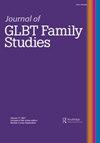基于性取向和性别角色表达的父亲临床评价
IF 2
Q2 FAMILY STUDIES
引用次数: 0
摘要
最近,人们开始关注传统的男子气概意识形态如何在各种情况下影响男性的福祉。我们试图测试男性意识形态对咨询心理学家对不同性取向(异性恋或同性恋)和性别角色表达(传统或非传统男性气质)的父亲的评价的影响。133名咨询心理学家被随机分配到四个实验操作的小插曲中,对一个养父在个人反应、育儿技巧和适应方面的措施进行评估。我们假设,在男性意识形态的调节作用下,心理咨询师会对在性取向或性别角色表达上违反传统男性意识形态的父亲给予较低的评分。MANCOVA分析显示,参与者对父亲的评价存在差异,但与我们基于性别角色应变理论预测的方式不同。一项后续的描述性判别分析显示,同性恋父亲得到了更有利的治疗师个人反应,而性别非传统的父亲被评为具有更有利的育儿技能和更不利的整体调整。总体而言,参与者对男子气概意识形态的认可程度较低,并且变化不大,这限制了适度分析的范围。研究结果讨论了与男性气质和性别角色研究的关系。本文章由计算机程序翻译,如有差异,请以英文原文为准。
Clinical Evaluations of Fathers Based on Sexual Orientation and Gender Role Expression
Abstract Attention has recently been given to how traditional masculinity ideologies impact men’s well-being in a variety of contexts. We sought to test the impact of masculinity ideology on counseling psychologists’ evaluations of fathers who varied on sexual orientation (heterosexual or gay) and gender role expression (traditional or nontraditional masculinity). One hundred and thirty-three counseling psychologists were randomly assigned to evaluate one of four experimentally manipulated vignettes regarding an adoptive father in distress on measures of personal reactions, parenting skills, and adjustment. We hypothesized that counseling psychologists would give poorer ratings to fathers who violated traditional masculinity ideology in sexual orientation or gender role expression, with masculinity ideology as a moderator. MANCOVA analysis showed differences in the way participants evaluated fathers, but not in the ways we predicted based on gender role strain theory. A follow-up descriptive discriminant analysis revealed that gay fathers received more favorable therapist personal reactions, and gender nontraditional fathers were rated as having more favorable parenting skills and less favorable overall adjustment. In general, the participants’ endorsement of masculinity ideology was low and had little variability which limited the scope of the moderation analysis. Findings are discussed in relation to masculinity and gender role studies.
求助全文
通过发布文献求助,成功后即可免费获取论文全文。
去求助
来源期刊

JOURNAL OF GLBT FAMILY STUDIES
FAMILY STUDIES-
CiteScore
3.90
自引率
0.00%
发文量
0
期刊介绍:
The Journal of GLBT Family Studies is a much-needed resource on the working dynamics of the diverse family structures found in every corner of the world. This groundbreaking new journal addresses the vital issues facing gay, lesbian, bisexual, and transgender individuals and their families. Edited by Dr. Jerry J. Bigner, who has provided expert witness testimony in legal cases and in the litigation involving same-sex marriages in Canada, the journal features interdisciplinary studies and scholarly essays on topics related to GLBT family life and functioning as well as relationships with other families.
 求助内容:
求助内容: 应助结果提醒方式:
应助结果提醒方式:


